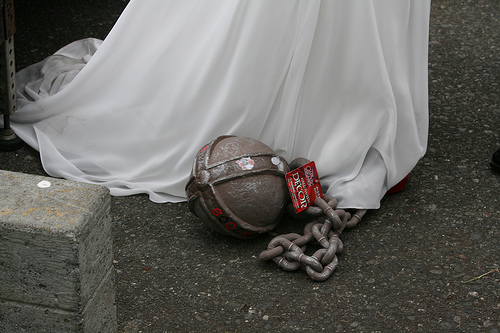OK, so I am several days late, but it doesn’t seem right that a blog dedicated to moral theology should allow the passing of the celebration of Martin Luther King, Jr.’s legacy without comment. Several events have coalesced recently that have reminded me of the continual need to reflect upon the legacy of Dr. King, the civil rights movements, active non-violence, racial tensions and inequalities, among other issues as a challenge for all people, Christians in general, and professional ethicists in particular. First, I attended an excellent presentation at the recent meeting of the Society of Christian Ethics by Prof. Sarah Azaransky in which she reflected upon the theological influence of Howard Thurman upon Dr. King and the later civil rights activists, as well as his continuing significance for those working to address racial inequality. Second, this past weekend marked the passing of Marv Davidov, a local peace activist in the Twin Cities (MN) who began his activism by participating in the freedom rides, and who taught classes in the Justice and Peace Studies program here at St. Thomas. Each of these people carries forward a tradition of which Martin Luther King’s civil rights activism was one expression. Moreover, seeing Dr. King as one expression of a much broader movement that was grounded in active non-violence, and was influenced by and connected to the struggles of Indians working with Ghandi, and other liberationist movements that pre-date the emergence of liberation theology in Latin America, is important to keep in mind in order not to keep Dr. King’s legacy in the box of ‘civil rights’ and disconnected from his other concerns.
I am always uncomfortable as a white, male academic trying to bring up issues related to racial inequality and discrimination, and so I was grateful for the ways in which Dr. Azaransky openly addressed and owned her own discomfort in speaking on this topic, while also affirming that she feels called to do so. I think this is probably the best approach – if we can name our discomfort together and communally, either as those who have inherited a series of social privileges through no merit of our own due to our skin color, or as those who are quietly but insidiously denied such privileges, then I think we can at least start to address the issue without quietly pretending it does not exist. For my own part, I was struck by the diversity of skin tones represented among the audience present for Dr. Azaransky’s paper, but as soon as it was over I found myself quickly leaving the room rather than sticking around to talk as I frequently do after such presentations. As I honestly try to reflect on this, it was because I felt uncomfortable stepping into conversations with others who I judge to have more of a “right” to speak authoritatively on this topic because they have different experiences and skin color than I do. This is unfortunate, because had I stuck around and listened I could have learned and been invited into conversation and conversion. It was a missed opportunity.
So, what are we to do? I don’t claim to propose a solution, but rather an example of how I try to keep Dr. King’s legacy and the difficult struggle to face racial inequality in my role as an academic, teacher, and scholar. First, in my Christian Morality class, and in other upper-division courses on Christian ethics, I always try to include some challenging texts on racism for my students to wrestle with. I have them read James Cone’s challenge to Catholics in his article, “Black Liberation Theology and Black Catholics: A Critical Conversation” (Theological Studies 61, 2000), or some of the articles written in response in that issue of Theological Studies that was dedicated to theological engagement with Cone and Black liberation theology. (Although I have not yet read it, I hope to use Bryan Massingale’s new book, Racial Justice and the Catholic Church, sometime in the future as well.) I find that my white students quickly become frustrated with Cone’s accusation that the Catholic Church is a racist institution, and the strong implication that despite their best intentions they are likely racist themselves. (Oddly, they simultaneously completely agree with the assertions made by Peggy McIntosh in her famous article, “Unpacking the Invisible Knapsack” – an incongruity that I find telling.) I usually play devil’s advocate to them in defending Cone’s position, and they squirm and become defensive, while my students of color nod their heads vigorously and try to convince their fellow students that racism is alive and well, despite having passed the civil rights act and despite well-intentioned white guilt.
Is this a solution? No, it is simply an anecdotal story about how I struggle to address these issues. The point is that I continually feel called into a conversation that makes me very uncomfortable, thanks in part to the challenging ways in which theologians like Cone, Massingale, and others, and noble yet imperfect leaders like Thurman, Dr. King, and others, have called us to address the issue of racism, to see how it is tied to our theological and ethical convictions, to expose the blind spots in a white-washed vision of ‘equality,’ to see how these issues are related to the Gospel and to active non-violence. I don’t have a solution, but it is a difficult conversation that needs to continue. As I sit squeemishly ready to hit the “publish” button to upload this post, I invite you to join me in this discomfort…





Thomas,
Thanks for this post – and I greatly appreciate your focus on discomfort. I taught Liberation theology twice last year in New Hampshire – and I frequently told my students that the point was not getting “the answer” but about learning to be “comfortable being uncomfortable.” Unless I learn to be uncomfortable and rest in that state – I don’t believe I can really SEE the world around me as it is and begin to face not only the injustice that’s hidden but my own complicity or participation in it.